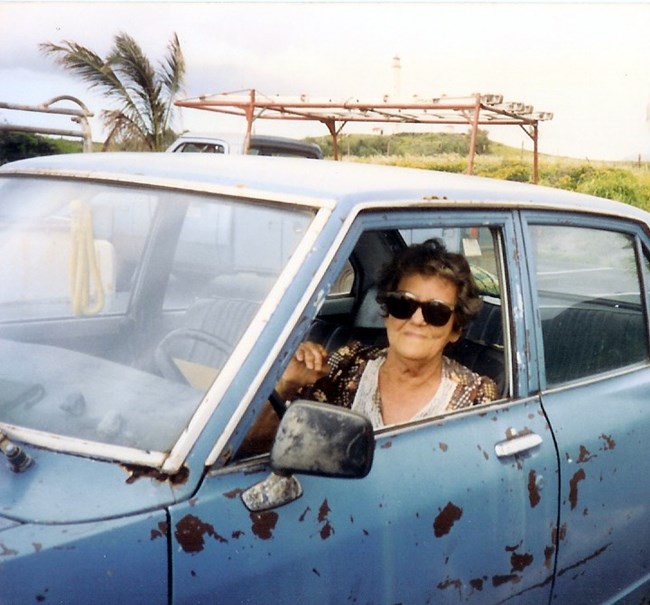Part of a series of articles titled Women's History in the Pacific West - Pacific Islands Collection.
Previous: Geraldine Kenui Bell
Next: Queen Ka'ahumanu
Article

Courtesy of the Estate of Olivia Robello Breitha.
“My name is Olivia. It’s not L-E-P-E-R….I wrote a book because I wanted people to know what I feel, what I felt, how much I struggled, fighting the disease, fighting ignorance, fighting bureaucrats, fighting that hurtful word.”1 So wrote Olivia Robello Breitha, a renowned author and Hansen’s disease activist who resided in Kalaupapa from 1937 until her death in 2006. Many societies have historically isolated sufferers of this infectious disease commonly known as “leprosy.” The Kingdom of Hawai‘i, and later the territory and state of Hawai‘i, sent over 8,000 Hansen’s disease patients to Kalaupapa from 1866 until the state ended the practice in 1969.2 In 1988, Breitha raised awareness about the ostracization that she and others experienced when she published one of the few memoirs by someone with this now curable disease.3
Breitha was born in 1916 on Kaua‘i to Portuguese immigrants Mary Fernandez and Manuel Robello.4 By 1934, she was engaged to be married, but that same year was diagnosed with leprosy and taken from her home.5 Her family moved multiple times to try and escape the stigma of having a family member with leprosy. Eventually some family members disowned her. She was taken to the Kalihi Hospital on Oahu where she became patient no. 3306. She explained later how in that moment she became dehumanized--just a number. In June 1937, Breitha was transferred to Kalaupapa, where she was prohibited from leaving the peninsula and isolated from non-patients.
At Kalaupapa, Breitha joined a community of patients who cared for one another and maintained local religious and economic institutions.6 Breitha worked as an orderly at the local settlement hospital and as a waitress. She married three times to residents of Kalaupapa who also had Hansen’s disease, but chose not to have children because quarantine policies mandated that they would be taken away at birth.7 Eventually, sulphone therapy helped treat the illness, and in 1969 the confinement laws ended, though many patients, including Breitha, remained at Kalaupapa. Kalaupapa National Historical Park was established in 1980, jointly managed by the National Park Service and the Hawai‘i State Department of Health. The bill that established the park guaranteed patients the right to live their lives peacefully and comfortably at Kalaupapa as long as they wished.8
After the publication of Breitha’s 1988 memoir Olivia--My Life of Exile in Kalaupapa, people wrote to and visited her at her home, thanking her for sharing her experiences. Anwei Law, international coordinator of Integration, Dignity, and Economic Advancement (IDEA), an organization for people with Hansen’s disease, explained that Breitha “wrote her autobiography to try and sensitize people to terminology, so they wouldn’t refer to people by labels that took away their identity and humanity.”9
Breitha expanded her activism and travel in the last few years of her life. She participated in the World Health Organization’s “Leprosy Awareness Month” and was one of the first to be given the “Voices of Humanity” award by IDEA. She testified at the Hawai‘i state legislature on death-with-dignity bills. Breitha expressed concern for the rights of people with other illnesses and drew strong parallels between Hansen’s disease and patients with AIDS.10 Her cousin Lorenzo DeStefano wrote the award-winning play Shipment Day about Breitha’s experiences between 1934 and 1937.11
Looking back, Breitha said that Kalaupapa, though once a prison, was a “paradise to me now….I am not just a number now. I finally regained the sense of dignity that was taken from me when I was a child.”12 She died at the age of 90 in Kalaupapa. The park continues to preserve the memories and experiences of Breitha and the thousands of others who were exiled to this remote peninsula.
Part of a series of articles titled Women's History in the Pacific West - Pacific Islands Collection.
Previous: Geraldine Kenui Bell
Next: Queen Ka'ahumanu
Last updated: September 13, 2022